 W
WLantis Co., Ltd. was a Japanese company that served as a music publisher label for Japanese musicians, anime soundtracks and video game soundtracks. It was established on November 26, 1999, and became a subsidiary of Bandai Visual in May 2006, itself a subsidiary of Bandai Namco Holdings. In February 2018, it was announced Lantis would be merged with Bandai Visual into a new company called Bandai Namco Arts. The reorganizing took effect on April 1, 2018. Lantis only remains as a label from the new company.
 W
WAir is a Japanese adult visual novel developed by Key and released on September 8, 2000, for Windows PCs. Key later released versions of Air without the erotic content, and the game was ported to the Dreamcast, PlayStation 2, PlayStation Portable, PlayStation Vita and Nintendo Switch. The story follows the life of Yukito Kunisaki, a traveling showman searching for the "girl in the sky". He arrives in a quiet, seaside town where he meets three girls, one of whom is the key to the end of his journey.
 W
WAkaneiro ni Somaru Saka , also known in short as Akasaka, is a Japanese adult visual novel developed by Feng and first released for Windows as a DVD on July 27, 2007. A version without adult content was released under the title Akaneiro ni Somaru Saka: Parallel on July 31, 2008, by GN Software for the PlayStation 2. A port of this version of the game was released for the PlayStation Portable on December 17, 2009, under the title Akaneiro ni Somaru Saka: Portable. The gameplay in Akaneiro ni Somaru Saka follows a plot line which offers pre-determined scenarios with courses of interaction, and focuses on the appeal of the six female main characters. Two light novels were produced in December 2007 and February 2008 written by different authors, and an Internet radio show began in April 2008. A manga adaptation began serialization in Kadokawa Shoten's seinen magazine Comp Ace on June 26, 2008, illustrated by Homare Sakazuki. An anime adaptation produced by TNK and directed by Keitaro Motonaga aired in Japan between October and December 2008.
 W
WCutie Honey: The Live is a Japanese tokusatsu production of the popular Cutie Honey manga and anime series, chiefly directed by Makoto Yokoyama and written primarily by Toshiki Inoue. It began airing on TV Tokyo on October 2, 2007. Gravure idol Mikie Hara portrays Honey Kisaragi, the title character.
 W
WDa Capo is a Japanese adult visual novel developed by Circus's division Circus Northern which was released as a limited edition on June 28, 2002 playable on Windows as a CD-ROM; a DVD-ROM version followed on July 26, 2002. An English release was scheduled for December 25, 2008, and the game was available for a brief time on that date, but the title was pulled until January 20, 2009. Da Capo began as a series of prelude short scenarios in the Suika fandisc Archimedes no Wasuremono, and since the initial release, there have been numerous different versions released for Windows and PlayStation 2 over the years with updated scenarios and characters. The gameplay in Da Capo follows a plot line which offers pre-determined scenarios with courses of interaction, and focuses on the appeal of the seven female main characters.
 W
WDa Capo II is a Japanese adult visual novel developed by Circus which was first released on May 26, 2006 for Windows computers. It is a part of the ongoing Da Capo series of games by Circus, and is the direct sequel to Circus' previous title Da Capo released in 2002. Da Capo II is described by Circus as a "ticklish school romance adventure . A fan disc, Da Capo II: Spring Celebration, was released on April 27, 2007 and features springtime stories set after the endings for each of the six Da Capo II heroines. An all-ages consumer port titled Da Capo II: Plus Situation containing additional scenarios was released for the PlayStation 2 in May 2008. The PlayStation 2 version was later ported to PC, titled Da Capo II: Plus Communication and containing the hentai scenes found in the original release, in December 2008.
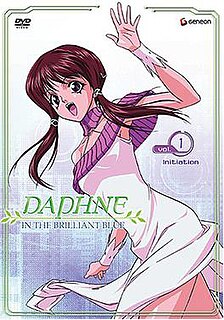 W
WDaphne in the Brilliant Blue is a Japanese anime television series animated by J.C.Staff and broadcast on TV Kanagawa from January to July 2004. The anime was originally licensed by Geneon USA. It is now licensed by Sentai Filmworks.
 W
WThe Disappearance of Haruhi Suzumiya is a 2010 Japanese animated drama film based on the fourth Haruhi Suzumiya light novel of the same name written by Nagaru Tanigawa. It was produced by Kyoto Animation, written by Fumihiko Shimo and directed by Tatsuya Ishihara and Yasuhiro Takemoto. It was released in Japanese theaters on February 6, 2010 and on DVD and Blu-ray Disc on December 18, 2010. The film has been licensed by Bandai Entertainment in North America and Manga Entertainment in the UK. With a length of 162 minutes, the film was the second-longest animated film at the time of its release.
 W
WFairlyLife is a Japanese adult visual novel developed by Hooksoft and was first released for Windows as a DVD on October 10, 2008 as a limited edition. FairlyLife is Hooksoft's seventh title, along with other games such as _Summer and HoneyComing. The game is described by the development team as "infinite gravity! A full power noisy miracle romantic comedy ADV" . The gameplay in FairlyLife follows a plot line which offers pre-determined scenarios with courses of interaction, and focuses on the appeal of the five female main characters. The title and logo of FairlyLife is reminiscent of Hooksoft's fourth title Like Life, and both games feature moe anthropomorphism. A manga adaptation illustrated by Kurumi Morisaki was serialized in Kadokawa Shoten's manga magazine Comp Ace between September 26 and November 26, 2008.
 W
WFigure 17 - Tsubasa & Hikaru is a Japanese anime television series animated at OLM, Inc. and directed by Naohito Takahashi. The series featured character designs by Yuriko Chiba and music by Toshihiko Takamizawa. The series is unusual due to it having an hour time slot per episode rather than the standard half hour time slot.
 W
WFree! is a Japanese anime television series produced by Kyoto Animation and Animation Do. The series is loosely based on the light novel, High Speed! , written by Kōji Ōji, which received an honorable mention in the second Kyoto Animation Award contest in 2011 and was published in July 2013. The first season titled, Free! - Iwatobi Swim Club for international distribution, aired in Japan in 2013; and the second season titled, Free! - Eternal Summer, aired in 2014. A third season of the anime series titled, Free! - Dive to the Future, aired in 2018. Hiroko Utsumi directed the first two seasons, while season three was directed by Eisaku Kawanami.
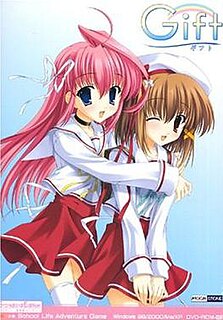 W
WGift is a Japanese adult visual novel developed by Moonstone and released on May 27, 2005, for Windows. The original game was a collaboration project where the company Circus helped to produce it, though Moonstone did the majority of the work involved. Gift is Moonstone's fourth title, and was followed up with an adult fan disc called Gift Rainbow-colored Stories released on January 27, 2006, for Windows. It was later ported to the PlayStation 2 and PlayStation Portable. The gameplay in Gift follows a plot line which offers pre-determined scenarios with courses of interaction, and focuses on the appeal of the five female main characters. The story revolves around Haruhiko Amami, a male high school student living in a town where a rainbow is always seen in the sky.
 W
WGirls Bravo is a Japanese manga series written and illustrated by Mario Kaneda and serialized from 2000 to 2005 in Shōnen Ace by Kadokawa Shoten. The story focuses on a high school boy who is allergic to girls who is transported to a mysterious world with a mostly female population; when he returns, one of the girls from that world becomes his housemate.
 W
WHaruhi Suzumiya is a Japanese light novel series written by Nagaru Tanigawa and illustrated by Noizi Ito. It was first published in 2003 by Kadokawa Shoten in Japan with the novel The Melancholy of Haruhi Suzumiya, and has since been followed by 11 additional novel volumes, an anime television series adaptation produced by Kyoto Animation, four manga series, an animated film, two original net animation series and several video games.
 W
WHidamari Sketch is a Japanese yonkoma manga series written and illustrated by Ume Aoki. It centers around a group of young female art students, following their daily lives as close friends and neighbors at the nearby Hidamari Apartments. The manga has been serialized in Houbunsha's monthly seinen magazine Manga Time Kirara Carat since April 2004, with its chapters collected in nine tankōbon volumes as of November 2016. Since 2008, Yen Press has licensed an English translation of the series in North America under the title Sunshine Sketch.
 W
WInnocent Venus is a Japanese anime television series which began broadcasting on the Wowow network in Japan on July 26, 2006 at midnight. The series makes use of some 3D cel-shaded animation, which achieves a more "hand drawn" look than traditional 3D animation. At Anime Boston 2007, ADV Films announced they licensed for the show. On July 11, 2008 ADV announced that it was discontinuing printing of the DVDs.
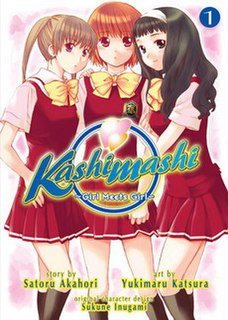 W
WKashimashi: Girl Meets Girl is a Japanese yuri manga series written by Satoru Akahori and illustrated by Yukimaru Katsura. The manga was originally serialized in Dengeki Daioh between the July 2004 and May 2007 issues, and later published in five bound volumes by MediaWorks from January 2005 to May 2007. The story focuses on Hazumu Osaragi, a normal, albeit effeminate high school boy who is killed when an alien spaceship crash lands on him, only to be restored to health as a girl. This results in a same-sex love triangle that Hazumu finds herself in with two of her best female friends.
 W
WKodomo no Jikan is a Japanese manga series written and illustrated by Kaworu Watashiya. The story revolves around a grade school teacher named Daisuke Aoki, whose main problem is that one of his students, Rin Kokonoe, has a crush on him. It was serialized between May 2005 and April 2013 in Futabasha's Comic High! magazine and is compiled in 13 volumes. At one time, an English-language version of the manga was licensed by Seven Seas Entertainment for distribution in North America under the title Nymphet, but they ultimately decided not to publish it due to controversies over its content. It was then relicensed by Digital Manga, who released the series in English through e-book.
 W
WLike Life is a Japanese adult visual novel developed by Hooksoft which was released on May 28, 2004 playable on Windows as a CD; a PlayStation 2 consumer console port called Like Life An Hour followed on April 28, 2005 by GN Software. An updated version of the original game released on September 28, 2007 called Like Life Renewal Edition , compatible up to Windows Vista, is playable on Windows as a DVD. A PlayStation Portable version of the game titled Like Life Every Hour was released on October 1, 2009. The gameplay in Like Life follows a plot line which offers pre-determined scenarios with courses of interaction, and focuses on the appeal of the five female main characters. The story revolves around Kazuma Kōsaka who is living a normal life in his aunt's home while he attends high school. One day, objects all over town start turning into girls, and his mobile phone is no exception; after the transformation, Kazuma names her Himeko Kōsaka.
 W
WLiving for the Day After Tomorrow is a Japanese manga series written and illustrated by J-ta Yamada. The manga was serialized in Mag Garden's magazine Comic Blade Masamune between March 3, 2005 and June 15, 2007; five bound volumes were released in Japan. The manga was adapted into an anime series produced by J.C.Staff, which aired in Japan between October and December 2006. The story is about a young girl who grows older into an adult, and an adult woman who becomes younger, turning into a child. The anime is licensed by Sentai Filmworks, and a complete series boxset was distributed by Section23 Films on DVD on April 13, 2010.
 W
WLove Live! School Idol Project Series is a Japanese multimedia project created by Hajime Yatate and Sakurako Kimino and co-produced by Kadokawa through ASCII Media Works; Bandai Namco Arts through music label Lantis; and animation studio Sunrise. Each of the individual titles within the franchise revolve around teenage girls who become "school idols". Starting in June 2010 with Love Live! School Idol Project, the franchise has seen multiple anime television series, two anime films, light novels, manga, and video games. The rhythm game series Love Live! School Idol Festival features characters across multiple Love Live! titles.
 W
WLove Live! is a Japanese multimedia project created by Hajime Yatate and Sakurako Kimino. Each of the individual titles within the franchise revolve around teenage girls who become "school idols". The first series of the franchise, titled Love Live! School Idol Project, was created in 2010 which consists of 9-members group called μ's. The second group, Aqours, was created in 2015. A spin-off group, which consists of 12 girls who are rivals to each other, Nijigasaki High School Idol Club, was created in 2018 as part of the franchise's game series Love Live! School Idol Festival All Stars. The fourth group, Liella!, was created in 2020 and consists of 5 first year high school girls.
 W
WLove Live! Nijigasaki High School Idol Club is a Japanese multimedia spin-off project from the Love Live! series and its game series Love Live! School Idol Festival. It was first introduced in 2017 as "Perfect Dream Project" and was initially created as part of the game Love Live! School Idol Festival All Stars. Unlike μ's and Aqours, the previous groups from the franchise, they are a group of individual school idols who compete with each other while working together to keep their school idol club alive. Together, they are referred as the Nijigasaki High School Idol Club.
 W
WLove Live! School Idol Festival is a Japanese rhythm game series developed by KLab and published by Bushiroad's Bushimo for Android and iOS platforms. It was first released in Japan on April 15, 2013 (Android) and June 8, 2013 (iOS). The game is free-to-play with an in-app purchase system. It features songs and characters from the series Love Live! School Idol Project and Love Live! Sunshine!!, newly introduced girls, and stories that are not included in other media in the Love Live! franchise.
 W
WLove Live! School Idol Festival is a Japanese rhythm game series developed by KLab and published by Bushiroad's Bushimo for Android and iOS platforms. It was first released in Japan on April 15, 2013 (Android) and June 8, 2013 (iOS). The game is free-to-play with an in-app purchase system. It features songs and characters from the series Love Live! School Idol Project and Love Live! Sunshine!!, newly introduced girls, and stories that are not included in other media in the Love Live! franchise.
 W
WLove Live! School Idol Festival is a Japanese rhythm game series developed by KLab and published by Bushiroad's Bushimo for Android and iOS platforms. It was first released in Japan on April 15, 2013 (Android) and June 8, 2013 (iOS). The game is free-to-play with an in-app purchase system. It features songs and characters from the series Love Live! School Idol Project and Love Live! Sunshine!!, newly introduced girls, and stories that are not included in other media in the Love Live! franchise.
 W
WLove Live! School Idol Festival is a Japanese rhythm game series developed by KLab and published by Bushiroad's Bushimo for Android and iOS platforms. It was first released in Japan on April 15, 2013 (Android) and June 8, 2013 (iOS). The game is free-to-play with an in-app purchase system. It features songs and characters from the series Love Live! School Idol Project and Love Live! Sunshine!!, newly introduced girls, and stories that are not included in other media in the Love Live! franchise.
 W
WLove Live! School Idol Project is a Japanese multimedia project co-developed by ASCII Media Works' Dengeki G's Magazine, music label Lantis, and animation studio Sunrise. It is the first multimedia project in the Love Live! franchise. The project revolves around a group of nine schoolgirl friends who become idols in order to save their school from shutting down. It launched in the August 2010 issue of Dengeki G's Magazine, and went on to produce music CDs, anime music videos, two manga adaptations, and video games.
 W
WLove Live! Sunshine!! is a Japanese multimedia project co-developed by ASCII Media Works' Dengeki G's Magazine, music label Lantis, and animation studio Sunrise. The project is the second series of the Love Live! franchise and is a spin-off sequel of Love Live! School Idol Project. The story of this project revolves around a new group of nine schoolgirls who become idols in order to save their school from shutting down. It launched in April 2015 with music CDs and anime music videos, followed by a manga version in 2016.
 W
WLove Live! Superstar!! is a Japanese multimedia project co-developed by Kadokawa Corporation, music label Lantis, and animation studio Sunrise. The project is the fourth installment in the Love Live! franchise after Love Live! School Idol Project, Love Live! Sunshine!!, and Love Live! Nijigasaki High School Idol Club. An anime television series premiered on NHK Educational TV on July 11, 2021.
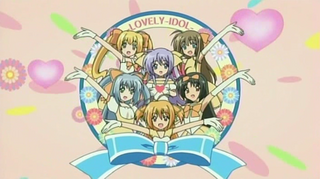 W
WLovedol ~Lovely Idol~ is the title of a Japanese series which focuses on a group of young girls who are striving to become famous Japanese idols.
 W
WLucky Star is a Japanese four-panel comic strip manga series by Kagami Yoshimizu. It has been serialized in Kadokawa Shoten's Comptiq magazine since December 2003. Cameo strips were published in other magazines such as Shōnen Ace and others. It has no ongoing plot and typically focuses on the daily lives of the characters.
 W
WMashiroiro Symphony: Love is pure white is a Japanese adult visual novel developed by Palette, and it was released in Japan on October 30, 2009 for Microsoft Windows PCs. Mashiroiro Symphony is Palette's ninth title. The gameplay in Mashiroiro Symphony follows a linear plot line, which offers pre-determined scenarios and differs upon the player's decisions, and its storyline focuses on the appeal of the four female main characters. Futago Minazuki has illustrated three manga adaptations serialized in Kadokawa Shoten's Comp Ace magazine. Four drama CD adaptations titled Mashiroiro Symphony Original Drama CD Series were released by Lantis in 2010. A 12-episode anime adaptation produced by Manglobe aired in Japan between October and December 2011.
 W
WMessage 01 is Minori Chihara's PV DVD. It also includes a bonus follow-up track to the album Contact on a separate CD as well as material related to the promotion of her career in the DVD.
 W
WOrange Pocket is an adult Japanese visual novel developed by Hooksoft which was released on June 13, 2003 for Windows as a CD. Subsequent enhanced ports to the Dreamcast as Orange Pocket: Cornet and to the PlayStation 2 as Orange Pocket: Root were released. Both ports feature their own exclusive characters and new scenarios not in the original Windows release. Limited editions of these versions were also released which contained a drama CD and a booklet with sketches and artwork of the girls in the game. The gameplay in Orange Pocket follows a plot line which offers pre-determined scenarios with courses of interaction, and focuses on the appeal of the female main characters. The story revolves around Hideaki Eda, who is enjoying a life in the country somewhere in Japan. His childhood friend moves from the city he used to live in to where he lives now and starts attending his school. She adapts to a rural life quickly and soon things start to become noisier as Hideaki begins to hang out with more girls from his school.
 W
WPlease Teacher! is an anime television series directed by Yasunori Ide, written by Yōsuke Kuroda, and produced by Bandai Visual. It was later adapted into a manga and light novel and centers on a group of friends and the odd things that happen to them after they get a new teacher.
 W
WPlease Twins! is an anime television series scripted by Yōsuke Kuroda and produced by Bandai Visual, which was later adapted into a light novel and one-volume manga series. It centers on a family of three teenagers in high school all living together who are unsure which two of them are related to each other due to a reference from an old photograph. The Please Twins! anime series is a spin-off sequel to Please Teacher!. It first aired in Japan on the WOWOW satellite television network on July 15, 2003 and finished with a total of 12 episodes plus a later OVA episode released on DVD. The series was later adapted into a light novel in 2004, which spanned a total of two volumes and, soon after, into a short one-tankōbon manga version, which was serialized in MediaWorks's Dengeki Daioh magazine in September 2005.
 W
WPotemayo (ぽてまよ) is a Japanese four-panel comic strip by Haruka Ogataya. The manga was first serialized in the four-panel manga magazine Moeyon in July 2004. In October 2005, the manga moved to the Japanese seinen manga magazine Comic High! and continued until January 2011. A 12-episode anime adaptation by J.C.Staff aired between July and September 2007 on Tokyo MX.
 W
WKimi ga Nozomu Eien , or Kiminozo for short, is a Japanese adult visual novel developed by Âge and released on August 3, 2001 for Windows. It was later ported to the Dreamcast and PlayStation 2. The gameplay in Kimi ga Nozomu Eien follows a branching plot line which offers pre-determined scenarios with courses of interaction, and focuses on the appeal of the eight female main characters by the player character.
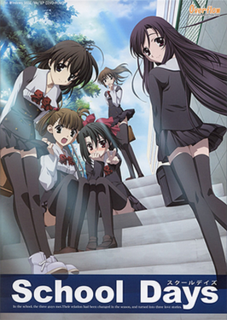 W
WSchool Days is a Japanese visual novel developed by 0verflow, released on April 28, 2005, for Windows as an adult game. It was later ported as a DVD game and for the PlayStation 2 (PS2) and PlayStation Portable (PSP). The story, a dramatic slice-of-life, follows Makoto Ito, a high school student who becomes the ambivalent love interest of several girls during his second term, and the effects this has on himself and his relationships with other characters. Though the game requires little interaction from users, School Days engages the player through a plot that they are given opportunities to change the course of during play. The game concludes with an ending specific to the outcome of the story, some of which became notorious for their graphic violence.
 W
WShigofumi: Letters from the Departed, titled Shigofumi: Stories of Last Letter in Japan, or simply Shigofumi, is a Japanese anime television series created by Tomorō Yuzawa and produced by Bandai Visual and Genco, which aired in Japan on Chiba TV and other networks between January 6 and March 22, 2008, and contains twelve episodes. An original video animation episodes was included with the final anime DVD volume released on September 26, 2008. A light novel series was originally adapted from the anime's premise set by Tomorō Yuzawa, featuring story composition and illustrations by Ryō Amamiya and Poko, respectively. Four novels were published by MediaWorks under their Dengeki Bunko imprint between October 2006 and March 2008. Despite the novels being produced first, the anime is considered the original work, as stated by Yuzawa. The anime was acquired by Bandai Visual for English language localization. The title Shigofumi comes from the combination of the Japanese words for "after death" , and "letter" , which literally translates to an "after death letter". However, the release was cancelled and Bandai Visual closed its North American branch. Sentai Filmworks picked up the license and released the entire series on DVD in 2010.
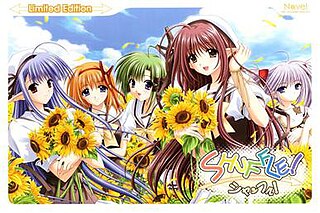 W
WShuffle! is a Japanese visual novel developed by Navel. It was originally released as an adult game for Windows on January 30, 2004. It was subsequently followed by an all-ages release for the PlayStation 2 (PS2) and an expanded adult release for Windows. The Windows version was localized in English by MangaGamer in 2009, and the PS2 version was localized in English by YumeHaven in 2016 on Steam. The gameplay in Shuffle! follows a branching plot line which offers pre-determined scenarios and courses of interaction and focuses on the appeal of the female main characters. Shuffle! has been re-made into an expanded version called Shuffle! Essence+. It has expanded routes for the original five main heroines as well as new routes for six other characters. Shuffle! also has three spin-off sequels: Tick! Tack!, Really? Really! and Shuffle! Love Rainbow.
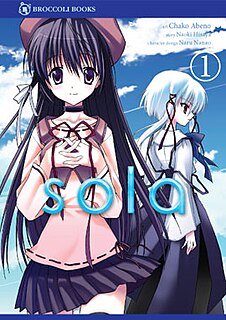 W
WSola is a Japanese work originally conceived by Naoki Hisaya with original character design by Naru Nanao. Sola is a mixed media project, first unveiled through the prologue of the manga featured in the Japanese manga magazine Dengeki Daioh on December 21, 2006, published by MediaWorks. The manga, which is illustrated by Chako Abeno, ended serialization on February 21, 2008. The manga has been licensed for distribution in North America by Broccoli Books with the first volume being released in June 2008. A short drama CD which also served as a prologue to the series was released at Comiket 71 in December 2006, and a second drama CD was released in May 2008. An anime version aired in Japan between April and June 2007; the anime contained thirteen episodes, and two additional DVD-exclusive episodes followed. The anime was licensed by Bandai Entertainment for distribution in North America in a subtitle-only box set of all fifteen episodes. The title, Sola, is close in pronunciation to the Japanese word sora . At the end of 2007, Japanese anime fans voted Sola as the best anime of the year.
 W
WStar Blazers 2199, known in Japan as Space Battleship Yamato 2199 , is a 2012–2013 Japanese military science fiction anime television series that is a remake of the first Space Battleship Yamato television series created by Yoshinobu Nishizaki and Leiji Matsumoto in 1974, known in the United States as Star Blazers. The series is a space opera, and was originally screened back-to-back in theaters across Japan, a few episodes at a time prior to release on home video, and aired on television from April 7, 2013 to September 29, 2013. Voyager Entertainment currently licensed the series outside Japan, with Funimation streaming their English dub of the series starting on November 8, 2017.
 W
WStrawberry Panic! is a series of Japanese illustrated short stories written by Sakurako Kimino, which focus on a group of teenage girls attending three affiliated all-girl schools on Astraea Hill. A common theme throughout the stories is the intimate lesbian relationships between the characters. The original artist was Chitose Maki, who was succeeded by Namuchi Takumi when production of the manga and light novels began.
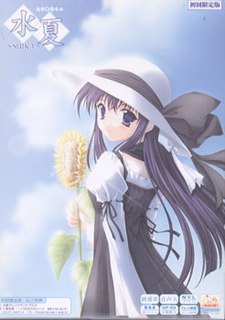 W
WSuika (水夏) is a Japanese adult visual novel developed by Circus and was first released on July 27, 2001 for Windows as a CD-ROM, followed by a DVD-ROM release on August 31, 2001. It was followed by two all-ages consumer ports for the PlayStation, retitled as Water Summer, and the Dreamcast on July 18, 2002, which was subsequently followed by an all-ages version for Windows, released on July 25, 2003. An expanded version, entitled Suika A.S+ (水夏A.S+), was released in Japan on September 24, 2004 with the adult content found in the original version, followed by a European release on April 25, 2009, and was again ported to the PlayStation 2, entitled Suika A.S+ Eternal Name , released on August 30, 2007 with the adult content removed. The gameplay in Suika follows a linear plot line, which offers pre-determined scenarios and courses of interaction, and focuses on the appeal of the main female characters.
 W
W_Summer , also known as Underbar Summer, is a Japanese adult visual novel developed by Hooksoft which was released on July 15, 2005, playable on Windows as a CD; a PlayStation 2 consumer console port called _Summer## followed on August 24, 2006, by GN Software. An updated version of the original game, called _Summer Renewal Edition , which is compatible up to Windows Vista as a DVD, was released on December 21, 2007.
 W
WSumomomo Momomo: The Strongest Bride on Earth is a Japanese manga series written and illustrated by Shinobu Ohtaka. Serialized in the manga magazine Young Gangan from 2004 to 2009, the individual chapters were collected and published into 12 tankōbon volumes by Square Enix. The story centers on a young girl, a strong martial artist, who wants to marry and bear a child with a boy that she believes to be a strong fighter. The title is based on the Japanese tongue twister Sumomo mo momo, momo mo momo, sumomo mo momo mo momo no uchi, which means Plums are peaches, and peaches are peaches, and plums and peaches are both types of peaches.
 W
WTrue Tears is a Japanese anime television series produced by P.A.Works and directed by Junji Nishimura. It aired in Japan on tvk between January 6, 2008 and March 30, 2008, containing thirteen episodes. The series shares almost nothing in common with the visual novel of the same name that preceded it, using an entirely different story with different characters, and a different art style. An Internet radio show hosted by three voice actresses from the series was also produced to promote it. A Blu-ray box set released in Japan contained an extra three-minute epilogue. Bandai Entertainment initially released the series in North America, but the license was later transferred to Discotek Media.
 W
WUtawarerumono is a Japanese adult tactical role-playing visual novel developed by Leaf, which released in April 2002 for Microsoft Windows. It was ported to the PlayStation 2, PlayStation Portable, PlayStation 4 and PlayStation Vita. In releases subsequent to the initial 2002 version, it is known by its more specific title Utawarerumono: Prelude to the Fallen .